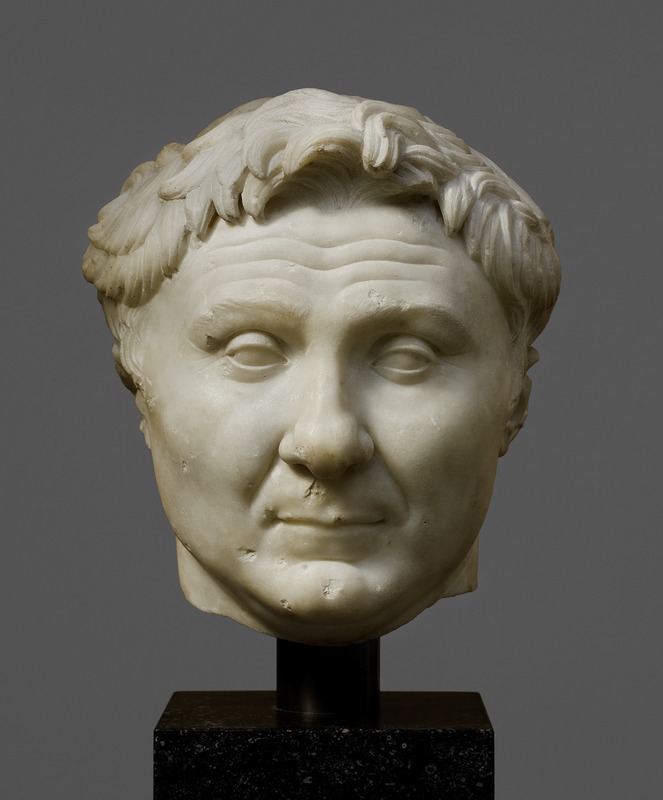Head of Pompey the Great
Title
Head of Pompey the Great
Date
1st century AD
Artist or Workshop
Unknown
Materials
Marble
Height of the work
41 cm tall
Provenience
Tomb of the Licinii, Via Salaria
Current Location
Ny Carlsberg Glyptotek
Sitter Biography
Pompey the Great was part of the First Triumvirate with Gaius Julius Caesar and Marcus Lisinius Crassus. Pompey and Caesar grew to be politically opposed to each other. While Caesar was on campaign in Gaul, Pompey is elected sole consul and later declares war on Caesar. Pompey fled to Greece after the Battle of Pharsalus, then to Egypt. He is then declared a traitor and later assassinated by Ptomely XIII in 46 BC.
Description and Significance
Description:
The bust is of Pompey’s head, with some of his neck showing down to his chin. It’s sculpted in the veristic style and depicts forehead, eye, and mouth lines. His face has some fleshiness to it, shown in his cheeks and underneath his chin. He has a thin mouth, a bulbous nose, and smaller eyes and ears with upraised eyebrows. His head is wider at the top and gets narrower down to the chin. Pompey has short cropped hair that is raised in the middle in a cowlick. He looks straight ahead.
Significance:
The face lines around his mouth, eyes, and forehead show age and imply wisdom and experience. The fleshiness of his face show that he is well-fed, implying wealth and an interest in finer things such as art and food. The bulbous head could be a realistic depiction of his physical appearance, or a way to show intelligence and strategy. The cowlick of hair in the center of his forehead calls back to the anastole of hair of Alexander the Great. Pompey is trying to connect himself with the deeds of Alexander and show that he is of the same caliber as a leader and military commander.
The bust is of Pompey’s head, with some of his neck showing down to his chin. It’s sculpted in the veristic style and depicts forehead, eye, and mouth lines. His face has some fleshiness to it, shown in his cheeks and underneath his chin. He has a thin mouth, a bulbous nose, and smaller eyes and ears with upraised eyebrows. His head is wider at the top and gets narrower down to the chin. Pompey has short cropped hair that is raised in the middle in a cowlick. He looks straight ahead.
Significance:
The face lines around his mouth, eyes, and forehead show age and imply wisdom and experience. The fleshiness of his face show that he is well-fed, implying wealth and an interest in finer things such as art and food. The bulbous head could be a realistic depiction of his physical appearance, or a way to show intelligence and strategy. The cowlick of hair in the center of his forehead calls back to the anastole of hair of Alexander the Great. Pompey is trying to connect himself with the deeds of Alexander and show that he is of the same caliber as a leader and military commander.
References
Johansen, F: Catalogue of Roman Portraits in the Ny Carlsberg Glyptotek (1994), Vol.1, 24, No. 1.
Poulsen: The Licinii Tomb Sculpture, Journal of the Walters Art Gallery (1948), 10.
Poulsen: The Licinii Tomb Sculpture, Journal of the Walters Art Gallery (1948), 10.
Contributor
Isabella Laurel
Citation
Unknown, “Head of Pompey the Great,” Digital Portrait "Basket" - ARTH488A - "Ancient Mediterranean Portraiture", accessed June 5, 2025, https://classicalchopped2.artinterp.org/omeka/items/show/31.
Item Relations
This item has no relations.

